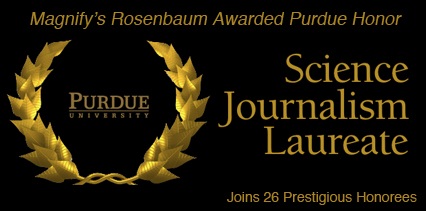Why Science Journalism Matters - Steve Rosenbaum

I have to say, when the phone rang last month from Perdue University, I was a bit surprised at first.
"You've been chosen to be honored as a Science Journalism Laureate for 2011" said Dr. Moria Gunn.
Really? I'm not sure I've ever thought of myself as a science journalist.
But, then I began to think about just what I do cover. I've been writing and reporting on the intersection of technology and sociology for the past five years. My blogposts have explored the emerging connection between content and human curation, the changing face of video distribution, the emergence and changes around user-generated content, and the shifting models for payment of content creators.
Oh, and then there was the book. Curation Nation was what pulled together the art and science of content into a hard-back exploration of how the world of the web was shifting from a technology focused distribution system to a human-edited ecosystem.
Which made me think about science, what is it - and what matters. There's no doubt that the internet's creation and evolution is based on technology. The science of the web, the shift from hard-wired to ubiquitous wireless connectivity, and the stunning growth of the App economy, are all both a social and a technological phenomenon.
Thinking about my journalism broadly, there's no doubt that what interests me is the emergence of technology as a broad-based and open platform for the distribution of ideas and content platforms.
And certainly we're arriving at a time where the idea of science is shifting from the exploration of things and physical objects - to the science of data, and digital objects. So after some amount of navel gazing, I do think that the exploration of digital phenomenon and the translation of them to stories that can be considered by the day to day users of data is, in fact, 'science journalism.'
In fact, the more I think about it - turning the conceptual issues of digital into tangible examples, the more urgent it becomes. One example is privacy. Eric Schmidt of Google is famous for saying that web privacy isn't an issue because you shouldn't be doing anything that you don't want to be found doing on the web. But this example of privacy reflects a data-collector's world view. And, when I share with average web users that their health insurance company could theoretically use data about you searching for say 'cancer' or 'alcoholism' as risk factors in evaluating your renewal, then the theory of 'privacy' becomes far more personal.
When science touches us, it moves out of the labs and into our lives. As the digital world becomes more a part of our day to day and moment to moment existence, the divide between digits and humans continues to narrow.
Which is to say - I'm proud to be a science journalist, if that means helping people understand the future of their digital lives.

Read Marketwatch Story here.
Steve Rosenbaum is founder and CEO of Magnify.net, and the Author of the recently released McGrawHill Business book "Curation Nation" (March / 2011). Steve can be contacted at steve@magnify.net Follow Steve Rosenbaum on Twitter: www.twitter.com/magnify
Read all Steve's MediaBizBloggers commentaries at Steve Rosenbaum - The Media Memo.
Check us out on Facebook at MediaBizBloggers.com
Follow our Twitter updates @MediaBizBlogger
The opinions and points of view expressed in this commentary are exclusively the views of the author and do not necessarily represent the views of MediaBizBloggers.com management or associated bloggers. MediaBizBloggers is an open thought leadership platform and readers may share their comments and opinions in response to all commentaries.

